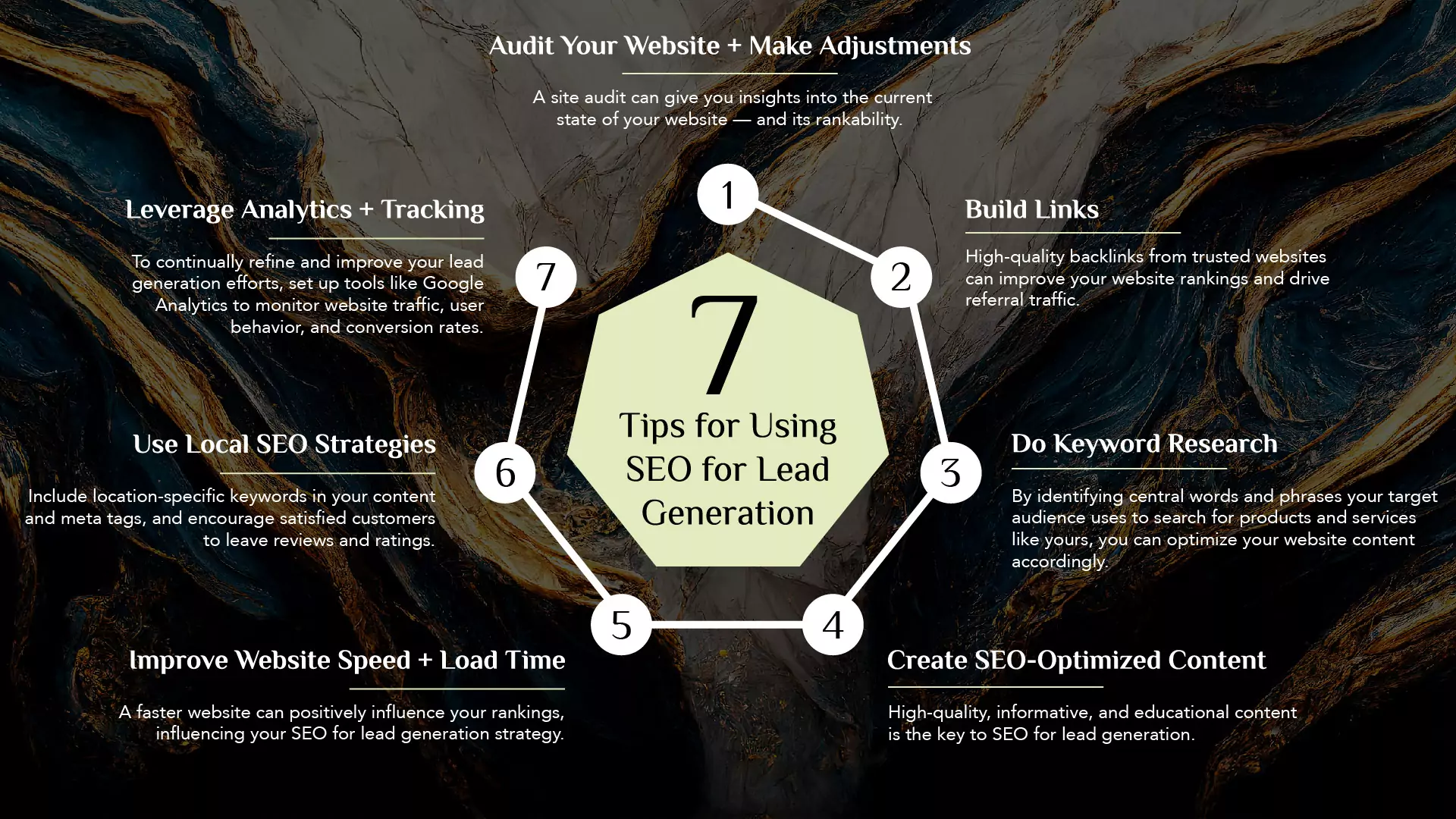Insights
Lead generation and search engine optimization (SEO) are two of the most important components of a digital marketing strategy. The two are highly compatible, and the SEO tactics that are most likely to improve rankings and build your brand also help generate leads. That makes SEO a win-win strategy for reaching your digital marketing goals.

The Benefits of SEO for Lead Generation
In the B2B landscape, SEO plays a pivotal role in driving high-quality leads and fostering sustainable growth. By optimizing your website for search engines, you can attract key decision-makers who are actively seeking solutions to their business challenges. SEO enables you to target specific keywords and phrases that align with the intent of your ideal prospects, ensuring that your brand appears prominently when they conduct online research.
More importantly, SEO offers long-term benefits for B2B lead generation. Unlike paid advertising, which stops generating traffic once the campaign ends, organic search traffic driven by SEO continues to flow as long as you maintain your search engine rankings. This sustainable approach to lead generation allows you to build a consistent pipeline of qualified leads without relying solely on short-term tactics.
Finally, SEO contributes to building brand authority and trust. When your website ranks highly for relevant keywords, it signals to potential Clients that your company is a credible and authoritative player in your industry. This perceived expertise can differentiate your brand from competitors and inspire confidence in your offerings. By providing valuable, SEO-optimized content that addresses the pain points and needs of your target audience, you establish your brand as a trusted resource, fostering long-term relationships and increasing the likelihood of conversions.
Seven Tips for Using SEO for Lead Generation
The following tips are foundational steps to take to improve your SEO practices, leading to improved lead generation over time.

1. Audit Your Website + Make Adjustments
 You can’t manage what you don’t measure. That’s why the first step in utilizing SEO for lead generation is to conduct a site audit. A site audit can give you insights into the current state of your website — and its rankability. Without an audit, you’ll be hard pressed to understand what the condition of your website is to make necessary changes. An audit can help you understand what content needs to be edited or removed, what the user experience of the site is, and more. The better the user experience of your site, the more likely a lead is to return or even convert.
You can’t manage what you don’t measure. That’s why the first step in utilizing SEO for lead generation is to conduct a site audit. A site audit can give you insights into the current state of your website — and its rankability. Without an audit, you’ll be hard pressed to understand what the condition of your website is to make necessary changes. An audit can help you understand what content needs to be edited or removed, what the user experience of the site is, and more. The better the user experience of your site, the more likely a lead is to return or even convert.
2. Build Links
High-quality backlinks from trusted websites can improve your website rankings and drive referral traffic. Engage in outreach and guest posting to acquire links from reputable blogs, directories, and resource pages. Additionally, use internal linking to guide users to key pages on your website and to improve navigation. This will keep potential leads engaged and moving forward on their buying journey.
3. Do Keyword Research
The foundation of any successful SEO for lead generation strategy is keyword research. By identifying central words and phrases your target audience uses to search for products and services like yours, you can optimize your website content accordingly. Incorporate your keywords into your content, meta tags, and URLs to improve your search rankings and attract qualified leads.
4. Create SEO-Optimized Content
High-quality, informative, and educational content is the key to SEO for lead generation. Create content that answers your audience’s questions and addresses their pain points, such as blog posts, whitepapers, eBooks, or case studies. Also, be sure to address on-page SEO tactics like internal linking, metadata, and more. By providing value and demonstrating your expertise, you will establish trust and credibility with your audience — including your potential leads. Optimize your content for SEO by incorporating keywords, headings, and meta descriptions and ensuring a high-quality user experience. In turn, this will support your lead-generation efforts by attracting relevant audiences.
5. Improve Website Speed + Load Time
 A faster website can positively influence your rankings, influencing your SEO for lead generation strategy. Google wants users to have a positive experience; part of that experience is your website load time. By improving your website load time, you can improve the user experience of your site overall, leading to better rankings. Potential ways to improve your site load time include adjusting your hosting, using an effective team, making the site mobile responsive, and optimizing your site for plugins, images, and more. With a better user experience, potential leads will be more likely to advance through the site and their buying journey.
A faster website can positively influence your rankings, influencing your SEO for lead generation strategy. Google wants users to have a positive experience; part of that experience is your website load time. By improving your website load time, you can improve the user experience of your site overall, leading to better rankings. Potential ways to improve your site load time include adjusting your hosting, using an effective team, making the site mobile responsive, and optimizing your site for plugins, images, and more. With a better user experience, potential leads will be more likely to advance through the site and their buying journey.
6. Use Local SEO Strategies
For businesses targeting local customers, local SEO for lead generation is a must. Claim and optimize your Google Business Profile listing to appear in local search results and on Google Maps. Include location-specific keywords in your content and meta tags, and encourage satisfied customers to leave reviews and ratings. By building a strong local presence, you'll attract nearby leads who are more likely to convert.
7. Leverage Analytics and Tracking
To continually refine and improve your lead generation efforts, tracking your SEO performance is crucial. Set up tools like Google Analytics to monitor website traffic, user behavior, and conversion rates. Use tracking URLs and lead capture forms to attribute leads to specific SEO campaigns and content pieces. By analyzing this data, you can identify top-performing keywords, pages, and tactics, and adjust your strategy accordingly.
SEO for Lead Generation is a Winning Strategy
SEO and lead generation are two essential components of a successful digital marketing strategy. By leveraging the power of SEO, B2B marketers can attract high-quality leads, build brand authority, and achieve long-term, sustainable growth. The tips outlined in this article provide a solid foundation for implementing an effective SEO for lead generation strategy.
From conducting a thorough website audit and performing keyword research to creating valuable, SEO-optimized content and building high-quality backlinks, each tactic plays a crucial role in improving your search engine rankings and attracting qualified leads. Additionally, focusing on local SEO and leveraging analytics and tracking tools will help you refine your approach and maximize your results.
As you embark on your SEO for lead generation journey, remember that success takes time and consistent effort. By staying committed to these best practices and continually adapting to the ever-evolving digital landscape, you'll be well on your way to driving more leads, fostering long-term relationships, and achieving your business goals.
Embrace the power of SEO and watch your lead generation efforts reach new heights with Br8kthru. With a Digital Marketing Gap Audit, our SEO experts will analyze your current SEO for lead generation efforts and make recommendations for improvements, including the above tactics.